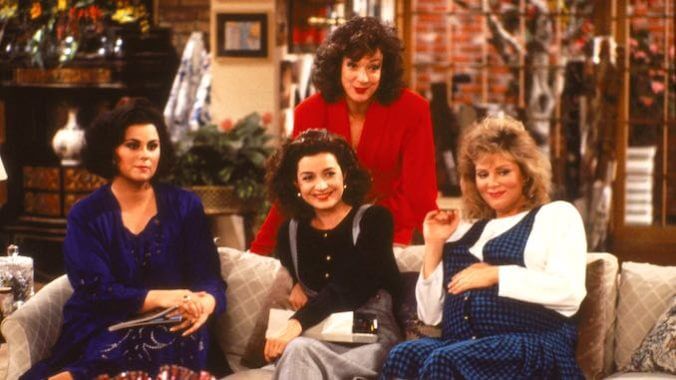TV Rewind: When Designing Women Put Georgia on Everyone’s Mind
Photo Courtesy of CBS
Editor’s Note: Welcome to our TV Rewind column! The Paste writers are diving into the streaming catalogue to discuss some of our favorite classic series as well as great shows we’re watching for the first time. Come relive your TV past with us, or discover what should be your next binge watch below:
![]()
Ensemble casts that are predominantly made up of women are certainly rare, and while The Golden Girls reigned supreme for much of the ‘80s, four more sassy ladies down in Atlanta arrived around the same time to give the Miami mothers a run for their money.
Airing on CBS from 1986 to 1993, Designing Women was a workplace sitcom centered around interior decorating firm Sugarbaker & Associates, led by the no-nonsense Julia Sugarbaker (Dixie Carter), whose lengthy speeches that cut to the bone as she was telling someone off earned her a fitting nickname, “The Terminator.” Along for the ride was her former beauty queen sister-come-salesperson Suzanne (Delta Burke), along with mild-mannered (for a while, anyway) designer Mary Jo Shively (Annie Potts), quirky office manager Charlene Frazier (Jean Smart), and the lone man in the hen house, deliveryman (later partner), Anthony Bouvier (Meshach Taylor). Sugarbaker family friend Bernice Clifton (Alice Ghostley) also pops up from time to time, known for—as the show frequently quips and according to Designing Women Online—her “arterial flow problem above the neck.” But the South itself, and certainly Georgia in particular, were in many ways just as important.
Thanks to its producers, the husband-and-wife team of Linda Bloodworth-Thomason and Harry Thomason, countless references to all things Southern crept up in almost every single episode, adding just as much color and texture as a chintz throw pillow or an antique vase. Loaded with plenty of references that only someone innately familiar with the region would get, Designing Women made it a point to not only highlight stereotypical notions, but to poke fun at them. In addition, jabs were also made at the expense of their non-Southern counterparts, usually as a snappy retort to those categorizations. Much of the cast were native Southerners, with the exception of the Seattle born-and-bred Smart, so it was a refreshing taste of life imitating art. In fact, bringing attention to those Southern stereotypes was the primary plotline of the Season 3 episode, “Getting Married and Eating Dirt.” In it, Julia gets on her soapbox when the New York Times publishes an article salaciously claiming that Southerners were competing in dirt-eating competitions, and leaves one of her classic speeches with the Features desk referencing the plethora of dishes one would happily munch on down there.
As the show progressed, the characters’ development certainly evolved. Tough-as-nails Julia’s reputation as “The Terminator” would come out as a result of a personal affront to her liberal or moral sensibility, but overall she was kind and maternal, loving and protective; Mary Jo went from rather meek in her status as a recent divorcée in the beginning of the series to a more assertive woman—even if she can’t hold her liquor too well; Charlene’s naivete, her large family, upbringing in rural Poplar Bluff, Missouri (Bloodworth-Thomason’s actual hometown) and humorously poor choice in men eventually evolve to lead her to a wonderful husband and child; Anthony’s desire to better himself as a former convict (always referred to as his “unfortunate incarceration”) not only brought him a partnership in the business, but a college degree. As for Suzanne, while she was certainly hilarious, she was self-absorbed, somewhat snobbish, immature and a bit inept, she was also known to rally when the situation warranted. In the Season 2 episode “Heart Attacks,” as Julia is agonizing over her longtime boyfriend’s hospitalization, Suzanne masterfully takes over—to the genuine surprise of the others. Charlene points this out to Mary Jo, making a comparison to one of the foremost Southern heroines in pop culture: “It’s amazing, isn’t it? Most of the time she goes around without the sense God gave a goose. Look at her. I mean, one crisis, and she’s Scarlett O’Hara.” They were embroiled in each other’s daily lives, and were so much closer than mere friends and coworkers.
-

-

-

-

-

-

-

-

-

-

-

-

-

-

-

-

-

-

-

-

-

-

-

-

-

-

-

-

-

-

-

-

-

-

-

-

-

-

-

-








































